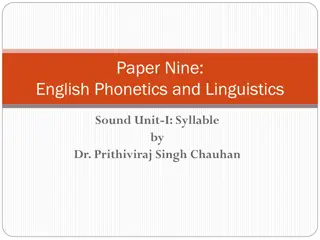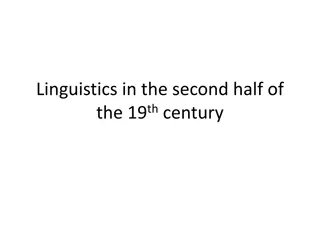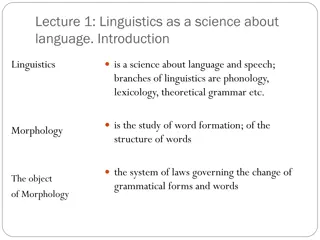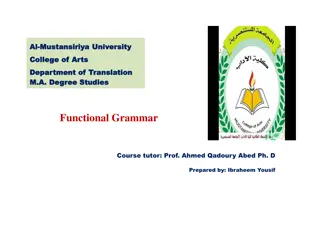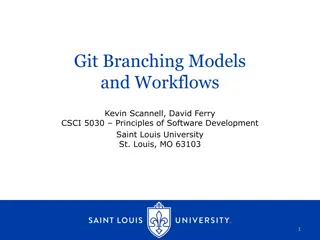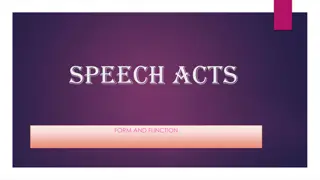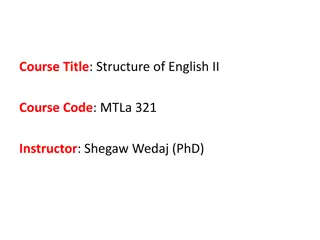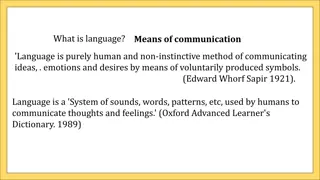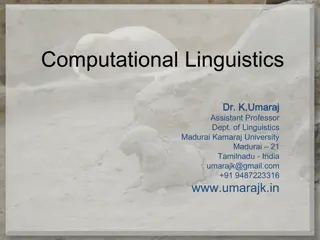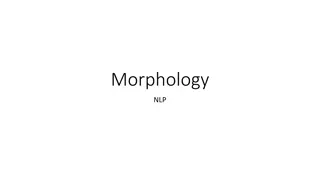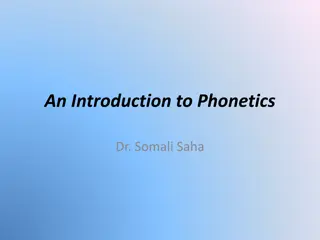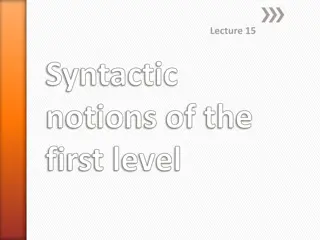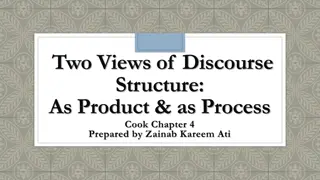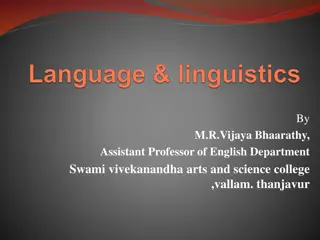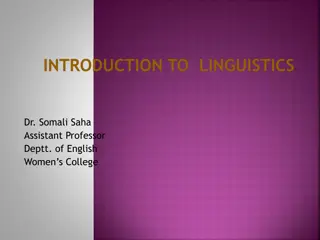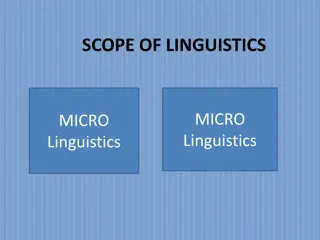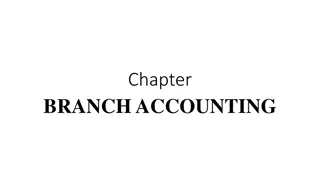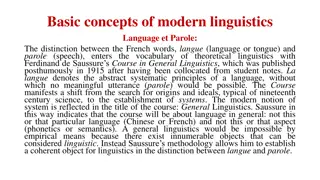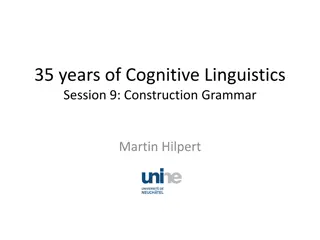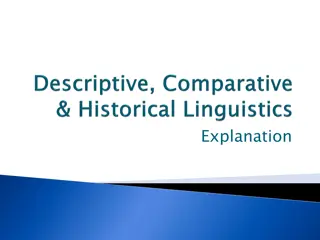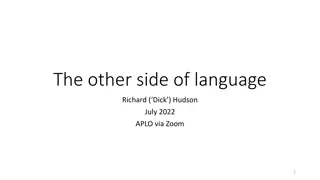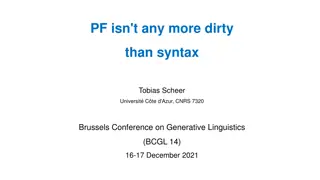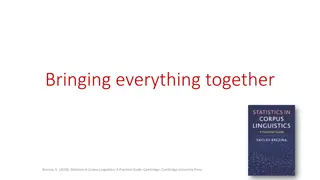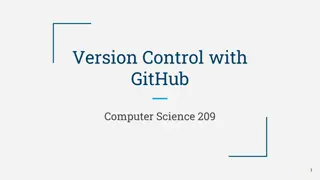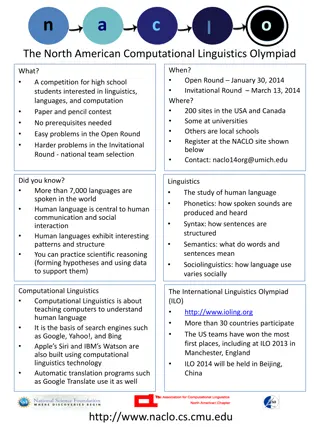Winners of Various Creative Competitions From Different Branches
Celebrate the creativity and talent of individuals from different branches who excelled in events like painting, doodle art, creative writing, and turncoat. The winners from Sultanpur, Mughalsarai, Bhadohi, and other branches showcased their exceptional skills and unique perspectives, earning recogn
1 views • 60 slides
Understanding English Syllables: Phonetics and Linguistics Insights
Explore the concept of syllables in English phonetics and linguistics, learning about syllable formation, examples of mono and disyllabic words, and the role of vowels and consonants in syllable structure. Delve into the essence of syllables as individual sound units within words. Discover more thro
10 views • 8 slides
Understanding Language and Linguistics
Language is a fundamental aspect of human communication, encompassing spoken and signed forms. Linguistics delves into syntax, semantics, morphology, phonology, and phonetics to analyze language structure and meaning. Phonetics explores how speech sounds are produced and perceived, shedding light on
9 views • 10 slides
Linguistics in the Second Half of the 19th Century: Schleicher, Psycholinguistics, Neogrammarian Theories
August Schleicher's biological approach to language, including his Stammbaumtheorie, aligned with Darwinian ideas prevalent in the 19th century. The origins of psycholinguistics can be traced back to Heymann Steinthal, who advanced the psychology of language. This period saw critical developments in
4 views • 22 slides
An Exploration of Stylistics in Linguistics: Expressive Means and Stylistic Devices 2. Stylistics as a branch of linguistics examines expressive means and stylistic devices which enhance the emotive and aesthetic qualities of language. These include
Stylistics, Linguistics, Expressive Means, Stylistic Devices, Language
5 views • 25 slides
Linguistics: Exploring Language Structure and Morphology
Linguistics is the scientific study of language and speech, encompassing branches like phonology, lexicology, and morphology. This field delves into the levels of language structure, such as phonological, morphological, lexical, syntactic, semantical, pragmatical, and stylistical. Scholars began inv
8 views • 7 slides
Understanding Systemic Functional Linguistics in Contemporary Language Studies
Explore the role of language in everyday life, the principles of Systemic Functional Linguistics, and the application of discourse analysis in translation. Delve into the Hallidayan model of language and discourse, examining genre, register, sociocultural environment, and more.
0 views • 20 slides
Git Branching Models and Workflows
Git branching models determine how code changes are managed and integrated in software development projects. This content discusses successful branching models, emphasizing the usage of master, develop, feature, release, and hotfix branches. It also explains why Git branching is different from centr
0 views • 13 slides
Understanding the Blood Supply of the Brain
The brain receives its blood supply from four major arteries - two vertebral arteries and two internal carotid arteries. The vertebral arteries branch into the basilar artery, which gives rise to various important branches. The internal carotid arteries supply the anterior and middle cerebral arteri
1 views • 30 slides
Understanding Speech Acts and Politeness in Linguistics
This informative content explores the concepts of speech acts, including direct and indirect speech acts, and the role of politeness in communication. It highlights how speakers convey intentions through their utterances, distinguishing between different speech acts such as requesting, commanding, a
1 views • 11 slides
Understanding Structural Linguistics: An Exploration of Language and Signs
Delve into the intricate world of structural linguistics through an in-depth analysis of language components, linguistic signs, and the relationship between language and linguistics. Explore the concepts of syntagmatic vs. paradigmatic relations, linguistic signs as associations of sound and meaning
4 views • 62 slides
Understanding Language: An Overview of Linguistics
Linguistics is the scientific study of language, a complex system of sounds, words, and patterns that humans use to communicate thoughts and feelings. Language consists of phonology (sounds), morphology (words), syntax (sentences), semantics (meaning), and pragmatics (contextual meaning). Different
0 views • 42 slides
Understanding Computational Linguistics and Natural Language Processing
Explore the fascinating fields of Computational Linguistics and Natural Language Processing (NLP), delving into their development, applications, and significance. Learn about the study of human languages in computational models, the importance of corpora in linguistic research, and the various types
1 views • 33 slides
Understanding Morphology in Linguistics
Morphology is a branch of linguistics that explores the structure of words in different languages. It involves dissecting words into meaningful parts called morphemes, such as prefixes and suffixes, to study their grammatical functions. Various distinctions like free vs. bound morphemes and derivati
1 views • 25 slides
Understanding Branch Accounting in Business Operations
Branch accounting involves managing multiple branches of a business separately to ascertain profits, financial positions, and performance. Dependent and independent branches have distinct features, with methods like debtors system used for accounting. This practice helps in controlling, expanding, o
0 views • 20 slides
Understanding the Basics of Phonetics and Linguistics
Explore the fundamentals of phonetics and linguistics, covering the components of language, the speech mechanism, respiratory system, articulatory system, phonatory system, voiceless and voiced sounds, and more. Dive into Dr. Somali Saha's "An Introduction to Phonetics" to grasp how sounds are artic
1 views • 10 slides
Understanding Independent Branches in Accounting
Independent branches in accounting operate autonomously, making purchases externally, receiving goods from the head office, setting their selling prices, and managing expenses from their own cash flow. They keep complete books, prepare financial statements independently, and may engage in inter-bran
0 views • 10 slides
Syntactic Notions of the First Level in Linguistics
In this lecture, the syntactic notions of the first level in linguistics are discussed, focusing on word groups, simple sentences, and the essential features of actual division. The different types of syntagmatic groupings of words, such as notional words, functional words, and their combinations, a
1 views • 19 slides
Understanding Discourse Structure in Linguistics
Pragmatics explores the relationship between language and the world, while discourse is seen as an interactive totality. Rank structures, as in linguistics, help analyze the grammar of sentences. The Birmingham School of Discourse Analysis pioneered influential studies in this field, focusing on sch
1 views • 29 slides
Understanding Linguistics: An Overview of Language Study
Linguistics is the scientific study of human language systems, encompassing phonetics, syntax, semantics, phonology, pragmatics, and morphology. It explores how language functions, aids in language teaching, and facilitates error analysis. The scope of linguistics includes investigating sound system
1 views • 21 slides
Understanding Linguistics: Overview, Branches, and Scopes
Linguistics explores the study of language, encompassing its nature, structure, and functions. It delves into the characteristics of human language, definitions, branches such as applied linguistics and psycholinguistics, as well as scopes like microlinguistics and macrolinguistics. The field invest
1 views • 11 slides
Overview of Micro and Macro Linguistics
Micro linguistics focuses on the scientific study of speech sounds, word formation, syntax, and meaning within a language, while macro linguistics delves into the societal, psychological, and neurological aspects of language use. Micro linguistic areas include phonetics, phonology, morphology, synta
1 views • 7 slides
Overview of Branch Accounting and its Importance in Business Operations
Branch accounting involves managing and tracking the financial activities of geographically separated branches within an enterprise. It helps in evaluating the profitability, financial position, and performance of each branch, determining the need for resources, and assessing the branch managers. Va
0 views • 20 slides
Understanding Saussure's Concepts of Langue and Parole in Modern Linguistics
The concepts of Langue and Parole introduced by Ferdinand de Saussure in the field of modern linguistics distinguish between the abstract systematic principles of language (Langue) and individual speech acts (Parole). Saussure's emphasis on the study of Langue as the foundation for meaningful uttera
0 views • 9 slides
Understanding Dependent Branches in Business Operations
In any business undertaking, as the business expands, it often establishes branches to market products over a wider territory. Dependent branches rely on the head office for supply of goods and cash, and do not maintain separate accounts. This article explores the types of branches, features of depe
1 views • 5 slides
Exploring Construction Grammar in Cognitive Linguistics Symposium
Delve into the realm of Construction Grammar with Martin Hilpert in the 35th year of Cognitive Linguistics. Discover the intricacies of idiomatic constructions, the distinction between constructions and constructs, coercion in neologisms, and more. Explore the relationship between Construction Gramm
1 views • 81 slides
Understanding Applied Linguistics: Definitions, Rationale, and Purpose
Delve into the realm of applied linguistics through a comprehensive outline featuring historical perspectives, defining moments, and the overarching purpose of this field. Explore how applied linguistics tackles language-related social issues and addresses challenges in education and communication.
0 views • 12 slides
Evolution of Linguistics: From Philosophy to Descriptive Study
Linguistics has evolved significantly from being a branch of philosophy to a distinct field called Descriptive Linguistics. It now focuses on studying language in itself rather than in relation to other disciplines, aiming to describe and analyze the structure and operation of languages at different
0 views • 20 slides
Understanding Halliday's Systemic Functional Linguistics
Exploring the concepts of Systemic Functional Linguistics as introduced by Halliday, this text delves into the role of language in everyday interactions, cultural studies, and literary theories. It highlights the different functions of language - interpersonal, ideational, and textual - and their ap
0 views • 25 slides
Exploring Linguistics and the Linguistics Olympiad
Dive into the world of linguistics with retired Professor Dick Hudson as he shares his journey of discovery and passion for language. Explore the challenges and joys of the Linguistics Olympiad, bridging the gap between the hard and soft sides of language. Discover the intricate connections in langu
0 views • 41 slides
Exploring Minimalism in Linguistics: Dirty PF and Clean Syntax
This text delves into the relationship between syntax and PF (Phonological Form) in the context of minimalism theory in linguistics. It discusses how minimalism aims to achieve clean syntax by discarding imperfect elements, with PF often considered as "dirty" due to its association with phonology. T
0 views • 40 slides
Understanding Physical Geography: Branches and Concepts Explored
Physical geography is a field that studies natural processes on Earth's surface, providing the backdrop for human activities. It encompasses various branches like geomorphology, climatology, oceanography, biogeography, soil geography, and environmental geography. Geomorphology investigates landforms
0 views • 10 slides
Practical Guide to Statistics in Corpus Linguistics
This content provides insights on statistical thinking principles in corpus linguistics, emphasizing attention to detail, data quality, effect size calculation, visualization, and the interplay between statistics and linguistics. It also touches on key learnings, clarifications, and directions based
0 views • 20 slides
Understanding the Three Branches of Government in the United States
The United States government is divided into three branches: legislative, executive, and judicial. This division of powers ensures a system of checks and balances, preventing any one branch from becoming too powerful. Each branch has specific roles and functions, such as making laws, enforcing laws,
0 views • 8 slides
Introduction to Science: Branches, Theories, and Scientific Method
Science involves observation, investigation, and experimentation to explore natural phenomena. The main branches of science include Earth & Space, Life, and Physical sciences. Theories are logical explanations based on repeated observations and must be testable and predictive. The Scientific Method
0 views • 41 slides
Exploring Modern Trends in Linguistics
Cognitive linguistics, functional grammar, text linguistics, and communicative linguistics are shaping the field of linguistics in the 21st century. These trends delve into the cognitive aspects of language, emphasizing language's role in organizing and conveying information. Cognitive linguistics h
0 views • 37 slides
Master Version Control with GitHub in Computer Science 209.1
Dive into the world of version control using GitHub, a powerful platform for code hosting and collaboration. Learn how to utilize repositories, branches, commits, and Pull Requests efficiently. Discover the process of creating repositories, managing branches, and working with files both locally and
1 views • 21 slides
North American Computational Linguistics Olympiad: A Competition for High School Students
The North American Computational Linguistics Olympiad (NACLO) is a competition for high school students interested in linguistics, languages, and computation. It consists of an Open Round in January and an Invitational Round in March, with no prerequisites needed. Participants tackle easy problems i
0 views • 4 slides
Unlocking the Power of Phraseology in Linguistics Research
CPA, led by Patrick Hanks, delves into collocation analysis and meaning interpretation in linguistics. By examining phraseological patterns, the institute aims to build a comprehensive inventory for various verb senses, highlighting the significance of normative and exploitative linguistic uses. The
0 views • 9 slides
Exploring Philosophical Branches: Epistemology, Metaphysics, Logic, and Axiology
Branches of Philosophy delve into various aspects of human knowledge and existence. Epistemology examines how individuals acquire knowledge, while Metaphysics ponders the nature of reality. Logic explores reasoning processes, and Axiology studies principles and values concerning ethics and aesthetic
0 views • 18 slides

